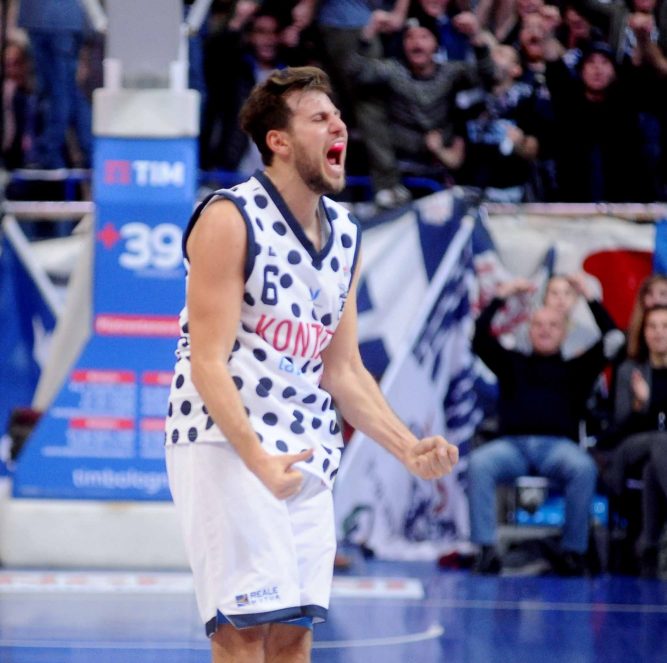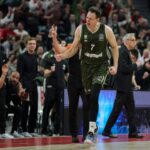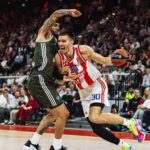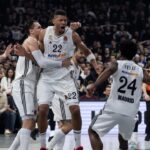
Nicolò Origgi on the long journey home for Stefano Mancinelli
Just over a decade ago, some then promising young Italian players were starting to make a name for themselves around the Bel Paese and Europe as well, thus catching the eyes of international scouts and drawing high praise from the media. Future NBAers Andrea Bargnani and Marco Belinelli – although one can argue about the first having not reached his full potential given his burdensome no. 1 pick label – have actually justified such hype over the following years, but this first generation of big domestic hopes included a couple of slightly older guys as well. Stefano Mancinelli belonged to this group too, alongside Reggio Emilia rising star Angelo Gigli – whose career has not panned out through multiple stops in prestigious clubs such as Treviso, Milan, Virtus Bologna and Rome. Time has obviously proven expectations around this ’83 born forward – back then regarded as an almost guaranteed NBA draft pick – to be at best unrealistic, yet Stefano has succeeded in a possibly even tougher task, cementing himself as an iconic figure of his alma mater club in a quite peculiar way given the recent adversities endured by the glorious Fortitudo Bologna team.
Mancinelli – a surname that seems tailor-made since in Italian the word mancino means left-handed – was thrown into the fire at the age of eighteen in a highly competitive Skipper team led by coach Matteo Boniciolli, but it was during Jasmin Repesa’s tenure that the Chieti native started to see the hardwood on a more regular basis – living the ascent to the 2004 Euroleague final and the crazy 2005 title-winning campaign as an important piece in the team rotations. At that time, Mancio was no more than an exciting high-flying athlete as he lacked any sort of a jumpshot and was not required to act as a go-to-guy on a team that could count on the likes of Gianluca Basile, Gianmarco Pozzecco, Milos Vujanic, Ruben Douglas, Matjaz Smodis as well as other young guns such as Erazem Lorbek and the abovementioned Belinelli. Soon thereafter, though, then owner Giorgio Seragnoli left Fortitudo, causing the club’s downsizing. As a consequence, a year after Basile, Vujanic, Pozzecco, Douglas and Smodis had already said goodbye, the current Milan’s coach and a number of important players – most notably Lorbek but also key guards Kiwane Garris and Nate Green – left the team. It was the start of a ruinous decline for the Bolognese powerhouse, one that would end in 2009 with an absurd relegation on the court – a last-second loss decided once more, ironically, by an instant replay review – and the club’s bankruptcy. In the meantime, Mancinelli had been named captain – even declining a two-year contract offer by the Portland Trailblazers after a successful summer league showing for them – and saw his role increased, finally free to showcase his hidden knack for one-on-one scoring – strictly with his beloved left hand. Grown into a matchup nightmare – too quick and crafty off the dribble for slower big men, too much at ease down low for smaller defenders thanks to his impressive footwork at the base of his trademark lefty baby hook and poisonous baseline spin – and a pillar of the Italian national team, at twenty-six Stefano had to leave Bologna no matter what. Thus, the wealthy Giorgio Armani was very happy to welcome him in Milan, hoping that this would boost Olimpia’s chances to dethrone the then unbeatable Siena.
Things, however, did not go as hoped. Mancinelli only showed flashes of brilliance and never broke into the hearts of Milanese fans, while the team could not overcome the biggest hurdles again and again even under a fruitless Dan Peterson cameo that ended with a humiliating ousting against archrivals Cantù in the 2011 playoffs semifinals. After three unsuccessful years, Stefano’s contract was not prolonged, leaving him without a team well into the 2012/2013 season. Unfortunately for him, he was signed by the same Cantù immediately after fan-favourite swingman Manuchar Markoishvili had been sold to Galatasaray. In spite of the usual optimism shown both by the employer and the employee in the very beginning, this experience was doomed to be a failure from day one for a couple of simple reasons. First, the replaced player had absolutely nothing in common with his replacement from a technical standpoint – the Georgian native having the skillset of a pure guard. Second, you can only imagine how Cantù supporters reacted to the arrival of a player who had only worn the jerseys of two among the most hated clubs over there. Therefore, the swift farewell to the tiny city above Como did not come as a surprise at all.
Having blown his last professional seasons and thus lost his spot on the national team, at only thirty Mancinelli accepted to restart his career from the second division in an ambitious Turin team. There, he won back the right to play in the top tier and subsequently helped avoiding an immediate relegation, rediscovering glimpses of his former self in the process. Last summer, though, stars had aligned for a sensational re-union with Fortitudo, in the meantime reborn from its ashes and returned to Legadue after some unexpected struggles under – strangely enough – Boniciolli’s guidance. Just as in the best happy ending possible for a novel, the prodigal son has finally been able to embrace his family again, now leading with example and passion a group of young domestic talents and experienced role players who have seen it all in the minor leagues. Mancio is back with the F on his chest, back where he belongs.




Leave a Reply